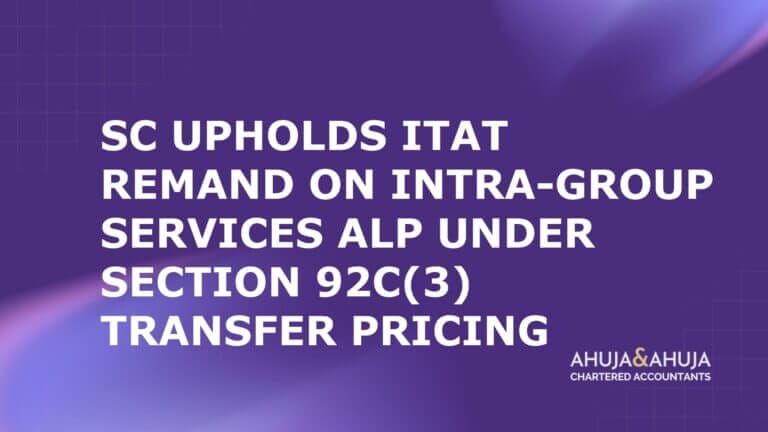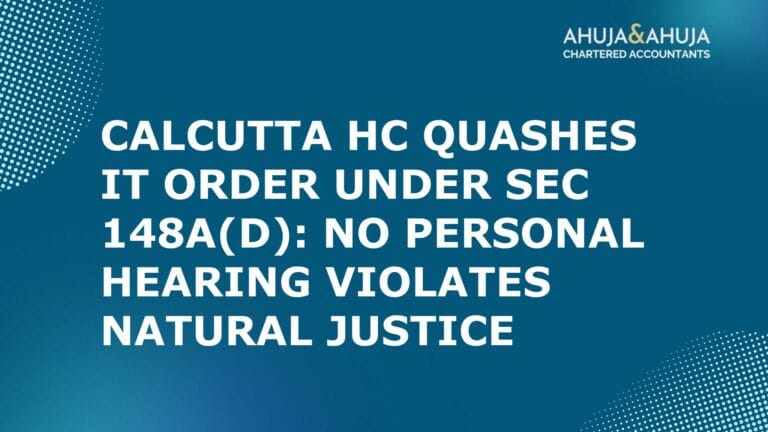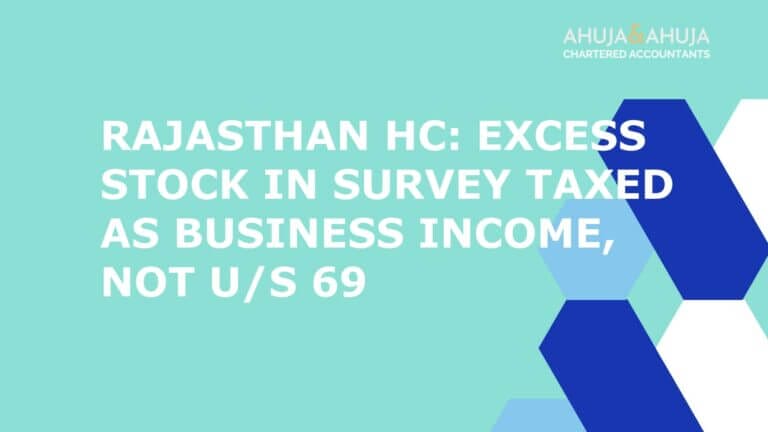Sections 54B & 54F: Exemptions Allowed Despite Minor Delays—Key Taxpayer Insights
India’s capital gains exemption regime is designed to encourage taxpayers to reinvest their gains in productive assets—be it a new home or agricultural land. Yet, in real life, the process is rarely as neat as the law’s timelines suggest. Sale proceeds often arrive in dribs and drabs, property deals get delayed, and family arrangements can muddy the waters. Recent tribunal decisions, especially the ITAT Ahmedabad’s ruling in Jobanji Thakor v. ITO (2025), have brought much-needed clarity to these grey areas. This article unpacks the practical implications for taxpayers and advisors, focusing on two key issues:
- Whether minor delays in reinvestment—especially due to staggered receipts—jeopardise your Section 54B or 54F exemption
- Why Section 54B exemption is strictly denied if the new agricultural land is not purchased in the assessee’s own name
Let’s break down what every taxpayer and advisor should know.
Understanding the Statutory Framework and Legislative Intent
Section 54B offers relief from capital gains tax when you sell agricultural land and reinvest the gains in new agricultural land. The law’s language is clear: the new land must be “purchased by the assessee.”
Section 54F provides exemption when you sell a long-term capital asset (other than a residential house) and invest the proceeds in a new residential property. Here, the law prescribes a window—typically one year before or two years after the sale—for making the investment.
Both sections are “beneficial provisions.” Their core purpose is to channel capital gains into productive, socially desirable assets—supporting agriculture, housing, and economic activity. Courts and the CBDT have repeatedly emphasised that these sections should be interpreted to further their legislative intent, not to trip up genuine taxpayers on technicalities.
Timing of Reinvestment Amid Staggered Receipts—Practical Strategies and Eligibility
Staggered Receipts: The Real-World Challenge
It’s common for sale proceeds to be received in instalments over several years, especially in large property transactions or family settlements. This staggered inflow can make it practically impossible to reinvest the entire capital gain within the strict statutory window. Taxpayers often worry: “Will I lose my exemption if I reinvest as and when funds arrive, even if that means missing the deadline by a few months?”
Judicial Wisdom: Substance Over Form
The Jobanji Thakor case is a landmark. The assessee sold agricultural land, received the sale proceeds over multiple years, and reinvested in new agricultural land and a residential house as funds became available. The Assessing Officer denied the exemption, citing delays beyond the prescribed period. However, the tribunal took a holistic view:
- Purpose of the Law: The exemption exists to promote reinvestment, not to punish minor procedural lapses.
- Substantive Compliance: If the taxpayer’s intent is clear and the capital gains are genuinely reinvested in the specified asset, minor delays—especially those caused by staggered receipts—should not defeat the exemption.
- CBDT Circular No. 359/1983: This circular supports the view that investments made before or after the transfer, as long as they are linked to the capital gain, should be considered eligible.
Key Precedents and CBDT Guidance
- Mrs. Parveen P. Bharucha v. DCIT (Bombay HC): The High Court held that exemption should not be denied merely because the investment was made before the actual transfer, as long as the intent and substance are satisfied.
- ITAT Pune in Ramesh Narhari Jakhadi v. ITO: Allowed exemption where the investment was made in advance of the sale, citing the CBDT circular.
- ITAT Jaipur in Laxminarayan v. ITO: Emphasised that the objective of Section 54B is to encourage reinvestment, not to penalise technical lapses.
Documentation: The Taxpayer’s Shield
To successfully claim exemption in such cases, robust documentation is critical:
- Purchase deeds and payment proofs for the new asset
- Bank statements showing the flow of funds from sale proceeds to investment
- Construction bills (for Section 54F) and advance payment receipts
- Correspondence with sellers explaining any delays or staggered payments
Advance Investment Before Asset Transfer
The law, as clarified by CBDT Circular No. 359, recognises that investments made even before the actual sale of the original asset can qualify for exemption, provided the funds are traceable and the intent is clear.
Proportionate Exemption for Partial Compliance
If only part of the capital gain is reinvested within the prescribed window, or if some investments fall outside the period due to staggered receipts, tribunals have allowed proportionate exemption. The Assessing Officer is directed to grant relief for the amount actually reinvested, rather than denying the entire claim.
Dispute Response Strategies
If faced with a challenge from the tax department:
- Demonstrate intent with a clear paper trail
- Trace the flow of funds from sale to investment
- Cite supportive case law and CBDT circulars
- Argue for “substantial compliance” where the legislative purpose is met
Navigating the Strict Ownership Requirement Under Section 54B
While the law and courts have shown flexibility on timing, ownership under Section 54B is a different ballgame altogether. Here, the Income Tax Act draws a hard line: the new agricultural land must be purchased in the assessee’s own name. Let’s break down what this means in practice, why it matters, and how to avoid common pitfalls.
Statutory and Judicial Standpoint: No Leeway on Ownership
Section 54B’s language is unambiguous—the exemption is available only if the new agricultural land is “purchased by the assessee.” The ITAT Ahmedabad in Jobanji Thakor v. ITO (2025) reaffirmed this, holding that:
- Land bought in a brother’s name (or any relative’s name) does not qualify.
- The law does not recognise “beneficial ownership” or “family intention” as a substitute for legal title.
- Even if the payment comes from the assessee’s account, if the sale deed is not in their name, the exemption fails.
This is a strict, literal interpretation—unlike the more liberal approach sometimes seen for timing or for Section 54/54F (where courts have occasionally allowed investment in a spouse’s or minor child’s name if the funds are clearly from the assessee).
Common Misconceptions and Compliance Risks
Many taxpayers assume that buying land in a close relative’s name—be it a brother, spouse, or child—will suffice, especially if the money trail is clear. This is a costly mistake under Section 54B. The courts have repeatedly rejected arguments based on:
- Family arrangements (“Samjuti Karar” or similar)
- Beneficial ownership (where the assessee claims to be the real owner despite the title being elsewhere)
- Post-facto rectification (trying to “fix” the title after the fact)
Key Point:
Section 54B is not swayed by intent or family ties—the name on the sale deed is what counts.
Contrasts with Sections 54/54F: Why the Rules Differ
- Section 54/54F: Some judicial decisions have allowed exemption when the new property is purchased in the name of a spouse or minor child, provided the investment is made from the assessee’s own funds and there is no intention to transfer the benefit.
- Section 54B: The statute is stricter. The benefit is not extended to purchases in the name of any relative, including spouse or children, unless the law is specifically amended or a clear precedent exists (which, as of now, it does not).
For a detailed understanding of Section 54F exemptions, refer to our comprehensive guide on Section 54F of the Income Tax Act.
Practical Guidance—How to Structure and Document Your Investment
To ensure your Section 54B claim stands up to scrutiny:
- Register the new agricultural land in your own name. If joint ownership is intended, ensure your name is on the deed and your share is clear.
- Avoid routing the purchase through relatives, even if for convenience.
- Keep all payment proofs, bank statements, and sale deeds in your name.
- If you must involve a family member (e.g., for succession planning), consult a tax advisor before executing the transaction.
Trying to “fix” the title after the fact—by family settlement, rectification deed, or affidavit—rarely works and is generally not accepted by tax authorities or courts.
For professional help with such tax-sensitive matters, consider consulting our expert income tax litigation services available for clients from Jodhpur and Moradabad.
Double Deduction Pitfalls: Don’t Fall Into the Trap
A common compliance risk is when both the assessee and a relative (say, a brother) claim exemption for the same investment. This is a red flag for the tax department and will almost always result in denial for one or both parties. Always check:
- Who is claiming the exemption in their return?
- Is the property registered in the name of the claimant?
- Has the exemption already been allowed in a relative’s assessment?
Is There Any Workaround or Recourse?
Short answer: No, if the land is not in your name, Section 54B exemption is not available.
- Family agreements, affidavits, or “Samjuti Karar” do not override the statutory requirement.
- Post-sale rectification is not a reliable remedy and is rarely accepted.
The only real solution is to plan ahead and ensure the purchase is structured correctly from the outset.
Key Takeaways (Part 2)
- Section 54B exemption is strictly available only if the new agricultural land is purchased in the assessee’s own name.
- No exemption for purchases in the name of a brother, spouse, or child—regardless of who paid.
- Beneficial ownership, family arrangements, or after-the-fact corrections do not suffice.
- Avoid double deduction by ensuring only the legal owner claims the exemption.
- Meticulous documentation and advance planning are your best defences.
At-a-Glance Q&A: Real-World Scenarios for Sections 54B & 54F
| Scenario | Section 54B Exemption | Section 54F Exemption | Action Point |
|---|---|---|---|
| Sale proceeds received in instalments; reinvestment delayed | ??* | ??* | Maintain documentation; claim proportionate exemption |
| Reinvestment made before sale of original asset | ??* | ??* | Cite CBDT Circular No. 359/1983; ensure fund tracing |
| New agricultural land bought in brother’s name | ? | N/A | Not eligible; must be in assessee’s name |
| New residential house bought in spouse’s name (from assessee’s funds) | N/A | ??** | May be eligible under 54F (if funds traced); check case law |
| Only part of capital gain reinvested within window | ??* | ??* | Proportionate exemption allowed |
| Both assessee and brother claim exemption for same land | ? | N/A | Double deduction not allowed; only legal owner can claim |
?? = Allowed if intent and documentation are clear; minor delays or advance investment permitted
??* = Allowed in some cases under Section 54/54F, not under Section 54B
? = Not allowed
Final Word
For taxpayers and advisors, the message is clear:
- Intent and documentation matter for timing—but ownership is non-negotiable under Section 54B.
- Plan your transactions with both the letter and spirit of the law in mind.
- When in doubt, seek professional advice and keep your paperwork watertight.
A little diligence today can save you a world of trouble tomorrow.
For those looking for trusted advisors in the National Capital Region, our Delhi office offers comprehensive tax and compliance services. Additionally, we assist clients in Ghaziabad for tailored finance and audit advisory.
If you want to explore broader finance and compliance assistance, do check our finance services and audit assurance services for holistic support.
Disclaimer
The materials provided herein are solely for educational and informational purposes. No attorney/professional-client relationship is created when you access or use the site or the materials. The information presented on this site does not constitute legal or professional advice and should not be relied upon for such purposes or used as a substitute for professional or legal advice.







